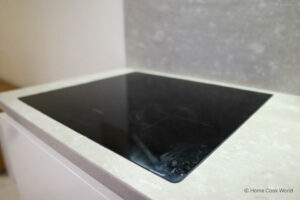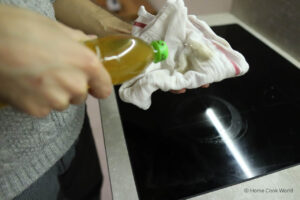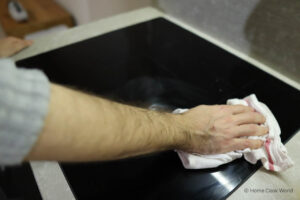If you are like me, then your induction cooktop is as much a part of your home’s decor as it is an appliance in your kitchen. Yet the unfortunate fact is that, no matter how careful you are with the surface, it will sooner or later get dirty.
At least this has been my experience owning an induction cooktop for four-five months by the time I wrote this post. For the majority of that time, I managed to keep it spotless. Until today, when I came across a few surprisingly stubborn white spots.
I tried to remove them with the cleaning spray I normally use, but nothing happened. Then, I dabbed a rag with soapy water and tried to scrub them off with it. Not much changed. That’s when I felt an adrenaline rush to my veins and started to panic…
Had I—in some weird, edge-case way I hadn’t foreseen—permanently damaged my cooktop? What fine-print from the owner’s manual had I not read? Would the warranty cover the damage that I had inflicted on my cooktop? Or would the white stains stay on its black and shiny surface forever?
So I did what I usually do when I’m out of my breadth and depth: I opened my laptop, opened Google in my browser, and set out to do some good ol’ research.
Happily, I found a surprisingly simple and extremely effective solution. And, if you found yourself in the same situation, I’m just about to share it with you.
How to Clean a Cloudy Cooktop

White stains on your cooktop? 
Dab a cloth with household vinegar 
Wipe the cooktop thoroughly with it 
The stains will come right off
First and foremost, don’t panic.
There’s a high chance that the white stains on your cooktop are nothing more than mineral deposits from the tap water running in your home.
With one pantry staple and the right technique, which I’m going to share with you in the next few lines, they’ll be much easier to remove than most of you probably think.
If hard water runs in your home and you often cook with wet pans or pots, calcium and magnesium from the evaporated water from the bottom of your cookware will eventually form white stains on your cooktop. To remove these stains, soak a lint-free cloth or paper towel with vinegar, and rub the cooktop with it until they go away.
Unlike their gas and electric counterparts, induction cooktops have no flame or any radiant burners that emit heat. Instead, there’s a copper coil connected to electricity under each of the zones. When you turn the cooktop on, it passes electricity through the coil, which creates an alternating electric current around it. If you place cookware that contains iron on top of it, it will pick up the current—and heat up.
If you cleaned your pan or pot right before putting it on your cooktop, there were probably a few drops of water left on the bottom of your pan. The water evaporated as you brought the pan or pot up to heat, but the calcium and magnesium in it burned and built up on the black surface.
Using vinegar, you can clean those mineral deposits right off.
Distilled white vinegar and apple cider vinegar are considered to be the best for cleaning (and are generally the least expensive).
Most bloggers out there will tell you to use only distilled white vinegar.
But that’s not necessarily your only choice; a few other varieties can be just as effective. For example, I used apple cider vinegar—as I had run out of distilled white—and it ended up working just as well.
There are some varieties you probably don’t want to clean your kitchen with. Generally speaking, you should avoid using dark, flavored vinegars like balsamic or sherry vinegar. Though they have a similar level of acidity as their distilled white counterpart, they’re also significantly pricier. You could probably find a better use for them dressing salads and marinating meat.
Why Is Vinegar Such a Good Cleaner?
Household vinegar is, in essence, a solution of 95% water and 5% acetic acid. Acetic acid is one of the best and most natural all-purpose cleaning agents, effective in removing hard water deposits from your cooktop, rust stains from your sink, and grease from your oven.
One study published in the Journal of Food Protection found that vinegar can kill food-borne pathogenic bacteria, including E.coli. Another study, published in Scientific Reports, concluded that vinegar “eradicates methicillin-resistant Staphylococcus aureus and resistant Escherichia coli.”
Apart from being extremely effective at degreasing your cooktop and removing mineral deposits from it, vinegar is also one of the cheapest and most natural cleaning agents you could possibly find on the market. It’s so good, it could entirely replace store-bought degreaser sprays and cleaning pastes.
